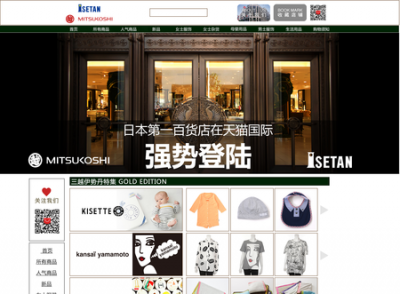Walmart further invests in Chinese e-commerce beauty site, Yihaodian

Yihaodian's database offers 8 million products for shoppers to choose from, including brands like L’Oréal Paris, Cetaphil, Borghese, Olay, Neutrogena, Head & Shoulders and Bioderma.
In recent years, Walmart has extended its online sales channel to include personal care and OTC medical products, aiming to cash in on this fast growing area.
Ultimately, beauty and personal care products can be ordered, paid for and delivered, alongside any type of grocery shopping.
Speaking on the most recent acquisition, Neil Ashe, CEO of Walmart global e-commerce, said: "This local experience, combined with Walmart’s global sourcing and our strong local retail presence and supply chain will allow us to deliver low prices on the products customers need in new and exciting ways."
“Yihaodian has excelled as one of China’s top e-commerce businesses. We’re excited about the team at Yihaodian and their strong local e-commerce experience," he adds.
Wang Lu, CEO of Walmart global e-commerce in Asia, will lead Yihaodian. The e-tailer will continue to operate under its existing name though and will focus on the needs of consumers in China.
Digital holds key to success in China
According to market researcher, L2 Thinktank; digital commerce may hold the key for global brands to crack the China market as e-commerce’s share of retail in the personal care space is four times greater than in mature markets and domestic brands struggle online.
Rapidly improving online payment and fulfillment infrastructure also signal continued growth. For example, Walmart-backed e-tailer Yihaodian has introduced Sina Weibo delivery tracking, one hour delivery windows, and electronic invoice service e-tapiao in Shanghai.
In 2014, China’s biggest e-commerce platform, Alibaba, purchased an 18% stake in leading micro blogging platform Sina Weibo, which now provides centralized social login and targeted advertising opportunities across its ecosystem.
Mobile social platforms, including WeChat, leverage mobile payment and loyalty programs to blur the line between online and offline sales.





![Latest developments from the South Korean beauty market. [Getty Images]](/var/wrbm_gb_food_pharma/storage/images/_aliases/wrbm_tiny/publications/cosmetics/cosmeticsdesign-asia.com/headlines/brand-innovation/korea-focus-able-c-c-kolmar-and-more-in-this-k-beauty-round-up/17357973-1-eng-GB/Korea-focus-Able-C-C-Kolmar-and-more-in-this-K-beauty-round-up.jpg)

![Able C&C has furthered its partnership with Japanese discount chain Daiso with new makeup launch. [A'pieu]](/var/wrbm_gb_food_pharma/storage/images/_aliases/wrbm_tiny/publications/cosmetics/cosmeticsdesign-asia.com/headlines/brand-innovation/a-pieu-and-daiso-launch-exclusive-2-makeup-line/17339117-1-eng-GB/A-pieu-and-Daiso-launch-exclusive-2-makeup-line.jpg)
![Down Under Enterprises is setting sights on the Asian market as environmental sustainability and traceability become increasingly important. [Getty Images]](/var/wrbm_gb_food_pharma/storage/images/_aliases/wrbm_tiny/publications/cosmetics/cosmeticsdesign-asia.com/headlines/market-trends/down-under-enterprises-shifts-focus-to-china-as-environmental-sustainability-traceability-come-into-the-spotlight/17304932-1-eng-GB/Down-Under-Enterprises-shifts-focus-to-China-as-environmental-sustainability-traceability-come-into-the-spotlight.jpg)
![News updates from Shiseido, Dr.Ci:Labo, Sephora, and more. [Shiseido]](/var/wrbm_gb_food_pharma/storage/images/_aliases/wrbm_tiny/publications/cosmetics/cosmeticsdesign-asia.com/headlines/brand-innovation/updates-from-shiseido-dr.ci-labo-sephora-and-more/17334944-1-eng-GB/Updates-from-Shiseido-Dr.Ci-Labo-Sephora-and-more.jpg)

![Clariant has underscored the importance of localisation strategies and distribution capabilities in China with beauty trends evolving at a rapid pace. [Getty Images]](/var/wrbm_gb_food_pharma/storage/images/_aliases/wrbm_tiny/publications/cosmetics/cosmeticsdesign-asia.com/article/2024/04/16/clariant-emphasises-importance-of-localisation-in-the-era-of-viral-trends/17327969-1-eng-GB/Clariant-emphasises-importance-of-localisation-in-the-era-of-viral-trends.jpg)
